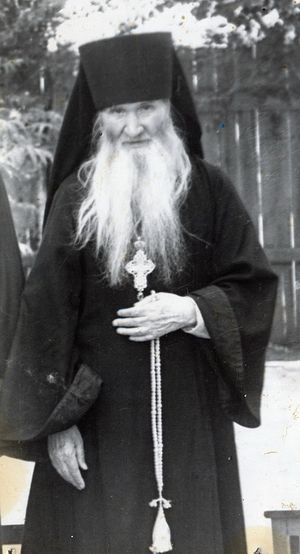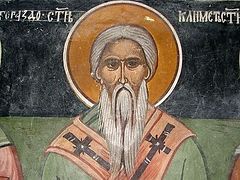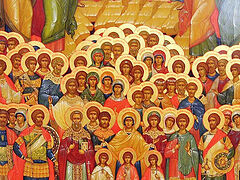 Photo: afanasiyfeodosiy.cerkov.ru
Photo: afanasiyfeodosiy.cerkov.ru
In the name of the Father, and of the Son, and of the Holy Spirit!
I would seem—how could you imitate and follow such people, dooming yourself to death—and to death in agony at that? But that era was special; it was different from the times we live in now. It was different in that the common people, and indeed any person (whether wealthy or not), always had the breath of death near him—it was always there. The population of the Earth was very small, with the largest cities and “megacities” having 10,000-20,000 inhabitants. People did not live long: many children were born, and half, or even most of them died in infancy. That is why the breath of death used to make people wonder: “What is the purpose and meaning of this life? What was I born for? To live for a very short period of time, and then die? Always to live in the fear that war, robbers, famine or pestilence will come, and I will die?” And, finally, the time of deliverance from these nagging questions and fears came.
When Christ came, what did He do? Christ rose from the dead, returning from where no one had ever returned before Him. For forty days He stayed with His disciples, teaching them the mysteries of the Kingdom of God, as stated in the Gospel. Hundreds of people witnessed His Resurrection. And when the Holy Spirit descended upon the apostles and the Church was founded, they went to preach. What did they preach? That Christ is risen from the dead. And the people who would join the Church experienced something else—not only the breath of death, but also the breath of eternal life. Because the Church appeared when the Holy Spirit was poured out upon the apostles. The Lord said: And I will pray the Father, and he shall give you another Comforter, that he may abide with you for ever… But the Comforter, which is the Holy Ghost, whom the Father will send in my name, he shall teach you all things… (Jn. 14:16, 26). The Apostle Paul said: For the Kingdom of God is not meat and drink; but righteousness, and peace, and joy in the Holy Ghost (Rom. 14:17). It was something invisible, imperishable, but so obvious that people readily accepted martyrdom. When we read the Lives of the martyrs, it is hard for us to believe that many of them accepted death joyfully. Why? Because they clearly felt this fire in themselves. The Holy Spirit descended upon the apostles in the form of fire. Christ proclaimed: I am come to send fire on the earth; and what will I, if it be already kindled (Lk. 12:49).
Whose prayers does God listen to? Who has greater boldness before God? Of course, the prayers of the saints. Why? Because saints are the people who suffer for Christ. In the Book of Job it is said that Job’s friends had sinned too much, and God would forgive them provided that Job prayed for them. Because Job suffered for God, and so did the saints. Why are their prayers the most effective? Because they are the purest. Because in suffering a person experiences two things. He has the deepest experience of his weakness, faintheartedness, lack of faith, fear, cowardice, and a feeling of his utter smallness and nothingness. And when he turns to God in this state, he feels His all-powerful help. And the more a person has sufferings and sorrows that he perceives properly, the more humility he has. The more humility you have, the more boldness before God you have. As stated in the Holy Scriptures: God resisteth the proud, but giveth grace unto the humble (Jm. 4:6).
 New Confessor Sebastian of Karaganda There are some inexplicable things in life that could be called “coincidences”. Some relatives of the holy New Confessor Sebastian of Karaganda—who for twenty years languished in prisons and labor camps during the terrible period of repressions and the Great Patriotic War—called our monastery. This saint was beaten and ordered to renounce Christ, just as in ancient times. In winters they tied him to trees and left him there naked alone for whole days—and he endured all this. And his relatives who called us told us something they regarded as a true miracle. Fr. Sebastian’s native village1 remained untouched throughout the war when everything around it was simply razed to the ground, the people were killed, and the houses were blown up, burned and destroyed. But the Germans never entered his native village; not a single house was damaged in it, and everything remained intact. And they said that every time the Germans wanted to enter it, there were some insurmountable obstacles—natural disasters or something else—that prevented them. This is what a saint’s prayer is like—it can work miracles.
New Confessor Sebastian of Karaganda There are some inexplicable things in life that could be called “coincidences”. Some relatives of the holy New Confessor Sebastian of Karaganda—who for twenty years languished in prisons and labor camps during the terrible period of repressions and the Great Patriotic War—called our monastery. This saint was beaten and ordered to renounce Christ, just as in ancient times. In winters they tied him to trees and left him there naked alone for whole days—and he endured all this. And his relatives who called us told us something they regarded as a true miracle. Fr. Sebastian’s native village1 remained untouched throughout the war when everything around it was simply razed to the ground, the people were killed, and the houses were blown up, burned and destroyed. But the Germans never entered his native village; not a single house was damaged in it, and everything remained intact. And they said that every time the Germans wanted to enter it, there were some insurmountable obstacles—natural disasters or something else—that prevented them. This is what a saint’s prayer is like—it can work miracles.
Of course, sometimes we have to live in terrible times. Just over 100 years ago, there was the Revolution in Russia, followed by absolutely brutal persecutions, which did not pass Optina Monastery by. The last famous Optina elder, St. Nektary (Nectarius), was dying in exile, going through extremely hard times. He was visited by people who were worried about the time of harsh trials; the Church was being persecuted, and they believed that the forces of the antichrist had obviously risen from hell. Their spirits wavered, and they would ask him despondently, “Father Nektary, is it already the end?” And St. Nektary replied, giving an answer to this question for all ages. He told them, “Don’t be afraid. The world and Russia will exist as long as there are righteous people. The Lord will keep both the world and Russia as long as such people exist.” And he added that we still had righteous people.
Who are the “righteous people” that God regards? Of course, those of His followers who fulfil His commandments. As we have heard today: Whosoever therefore shall confess Me before men, him will I confess also before My Father which is in Heaven (Mt. 10:32); He that loveth father or mother more than Me is not worthy of Me: and he that loveth son or daughter more than Me is not worthy of Me (Mt. 10:37), says the Lord. Why? Because no matter how hard we try and what efforts we make, our children, parents, friends and dearest loved ones will be sick, suffer and die. And it all comes down to one thing: “Lord, help us!” It all boils down to just this. Therefore, the Lord gives us a commandment in advance so that He should come first. There are these words in the Holy Scriptures: Except the Lord build the house, they labour in vain that build it. Except the Lord keep the city, he that keepeth it watcheth but in vain (Ps. 126:1)—all of this is useless unless God keeps the city.
Dear brothers and sisters in Christ, God has called us, the people of the Church, to righteousness. When God decides the destiny of the world, He looks at us, His followers: what we are like and what is useful for us. If peace is saving for us, He sends us peace; if war is saving for us, He sends us war. If we don’t want to accept the circumstances we are placed in, then, unfortunately, everything will get even worse. So, we should endure whatever the Lord sends us.
There are a number of hackneyed phrases in our spiritual life. One of them is, “Thank God!”; another example is, “We must pray.” These are such concepts that by often repeating them, people see no sense in them at all. But when you read the Gospel, you really need to reflect on this. Here is the Lord’s commandment: Be ye therefore perfect, even as your Father which is in heaven is perfect (Mt. 5:48); But as He which hath called you is holy, so be ye holy… Because it is written, Be ye holy; for I am holy (1 Pet. 1:15-16). And many people ask themselves, “But how is it possible? I can’t do this and can’t do that either; this is difficult, and that is difficult too.” But the Lord says, For My yoke is easy, and My burden is light (Mt. 11:30). “How can it be easy and good if everything is so complicated and I succeed in nothing?” It is easy and light because the Lord asserted, He that abideth in Me, and I in him, the same bringeth forth much fruit: for without Me ye can do nothing (Jn. 15:5).
So, beloved brothers and sisters, when we address any problem or sorrow, or struggle with any passion on our own, all this is doomed to a dead end and a failure. This is when we get confused, unable to figure out how to overcome it. So, let us humble ourselves and cry out to God. The Holy Fathers taught: “The mother of all virtues is prayer”—although not in the sense of prayer itself, for prayer is just a tool. It is God Who helps us when we ask Him for it. Therefore, dear brothers and sisters, if we ask Him humbly, the Lord will help us and in such a way that we will even do the impossible. May God’s help be with you all. Amen. Happy feast! May God save you!



